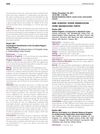1 citations,
November 2013 in “Actas dermo-sifiliográficas/Actas dermo-sifiliográficas” Experts met to improve care for ichthyosis patients in Spain.
 69 citations,
July 2015 in “Pharmacotherapy”
69 citations,
July 2015 in “Pharmacotherapy” Low-dose finasteride may cause lasting sexual dysfunction and suicidal thoughts in young men.
 18 citations,
October 2012 in “Dermatologic Clinics”
18 citations,
October 2012 in “Dermatologic Clinics” Early diagnosis and aggressive treatment are key for managing rare scalp disorders that cause permanent hair loss.
 January 2016 in “Georg Thieme Verlag eBooks”
January 2016 in “Georg Thieme Verlag eBooks” The document recommends personalized, culturally sensitive treatments to rejuvenate the aging Asian face, focusing on natural results and specific techniques for skin, hair, and facial features.
 49 citations,
January 1980 in “Journal of Cardiovascular Pharmacology”
49 citations,
January 1980 in “Journal of Cardiovascular Pharmacology” Minoxidil doesn't increase pericardial disorder risk, but may cause fluid accumulation.
 41 citations,
March 2010 in “Psychology Research and Behavior Management”
41 citations,
March 2010 in “Psychology Research and Behavior Management” Using psychological treatments can help manage skin conditions along with regular medical care.
 5 citations,
February 2010 in “Expert Review of Dermatology”
5 citations,
February 2010 in “Expert Review of Dermatology” Treating both the mind and skin together, especially by managing stress, can greatly improve outcomes for skin disorders linked to psychological issues.
 January 2012 in “Current Therapy In Oral and Maxillofacial Surgery”
January 2012 in “Current Therapy In Oral and Maxillofacial Surgery” Endoscopic forehead and brow lifting safely and consistently improves aged eyebrows, but may have complications.
 23 citations,
June 1999 in “Clinical Therapeutics”
23 citations,
June 1999 in “Clinical Therapeutics” Finasteride is a cost-effective option for treating BPH, reducing risk of urinary issues and surgery.
 17 citations,
June 2012 in “Australasian Journal of Dermatology”
17 citations,
June 2012 in “Australasian Journal of Dermatology” Finasteride and low-dose dutasteride combo improves hair growth and reduces hair loss with no major side effects.
 3 citations,
July 2018 in “African Journal of Urology”
3 citations,
July 2018 in “African Journal of Urology” Finasteride before TURP reduces blood loss and slightly improves early postoperative quality of life.
 October 2023 in “Benha Journal of Applied Sciences”
October 2023 in “Benha Journal of Applied Sciences” Insulin resistance may contribute to hair loss in people with androgenic alopecia.
 2295 citations,
August 2012 in “The international journal of transgenderism/International journal of transgenderism”
2295 citations,
August 2012 in “The international journal of transgenderism/International journal of transgenderism” The guidelines recommend informed consent for gender-affirming treatments and stress the importance of personalized, culturally sensitive care for transgender individuals.
 11 citations,
April 1990 in “Australasian Journal of Dermatology”
11 citations,
April 1990 in “Australasian Journal of Dermatology” Minoxidil modestly increases hair growth in men with early baldness and is safe to use.
 10 citations,
July 2021 in “International Journal of Rheumatic Diseases”
10 citations,
July 2021 in “International Journal of Rheumatic Diseases” Lupus patients' body image issues significantly affect their mental health and need more support.
 7 citations,
July 2019 in “Clinics in Dermatology”
7 citations,
July 2019 in “Clinics in Dermatology” Hair loss can indicate or worsen with systemic diseases, and treating the underlying condition is important.
 March 2013 in “Revista Brasileira de Cirurgia Plástica”
March 2013 in “Revista Brasileira de Cirurgia Plástica” Using platelet growth factors can improve hair density in transplants, especially for those with fine hair.
 June 2024 in “International journal of women’s dermatology”
June 2024 in “International journal of women’s dermatology” Dermatology residents need better training to treat hair conditions in patients with skin of color.
 31 citations,
August 2022 in “Frontiers in Oncology”
31 citations,
August 2022 in “Frontiers in Oncology” Photobiomodulation therapy helps manage cancer treatment side effects but needs more research for optimization.
 1 citations,
April 2022 in “Emergency Medicine Australasia”
1 citations,
April 2022 in “Emergency Medicine Australasia” The document concludes that respectful, gender-affirming healthcare improves mental health and encourages continued medical care for transgender and non-binary individuals.
1 citations,
November 2023 in “Medicina” Hormone therapy improves mental well-being in transgender individuals but requires ongoing health monitoring.
9 citations,
June 2020 in “Trials” The trial aims to test if spironolactone is an effective acne treatment for women without the side effects of current treatments.
 January 2017 in “Journal of Investigative Dermatology Symposium Proceedings”
January 2017 in “Journal of Investigative Dermatology Symposium Proceedings” The 2015 Hair Research Congress concluded that stem cells, maraviroc, and simvastatin could potentially treat Alopecia Areata, topical minoxidil, finasteride, and steroids could treat Frontal Fibrosing Alopecia, and PTGDR2 antagonists could also treat alopecia. They also found that low-level light therapy could help with hair loss, a robotic device could assist in hair extraction, and nutrition could aid hair growth. They suggested that Alopecia Areata is an inflammatory disorder, not a single disease, indicating a need for personalized treatments.
 3 citations,
September 2019 in “Journal of Orthodontics”
3 citations,
September 2019 in “Journal of Orthodontics” A boy's hair grew back after he stopped using orthodontic headgear that caused temporary hair loss.

The data suggests that dosing differences can help manage spasticity in patients with upper motor neuron dysfunction.
 72 citations,
September 1997 in “Dermatologic Surgery”
72 citations,
September 1997 in “Dermatologic Surgery” Careful planning and patient counseling can lead to excellent hair transplant results, often in one or two sessions.
 January 2025 in “Frontiers in Immunology”
January 2025 in “Frontiers in Immunology” IVIG therapy significantly improved symptoms in a patient with APS-2 and SPS.
 42 citations,
April 2012 in “Seminars in Oncology”
42 citations,
April 2012 in “Seminars in Oncology” Targeted cancer therapies often cause skin problems that need careful management to improve patient quality of life and treatment success.
 7 citations,
October 2018 in “Aesthetic Surgery Journal”
7 citations,
October 2018 in “Aesthetic Surgery Journal” The hairline lowering surgery with bone tunneling suture fixation is safe and effective, with high patient satisfaction.
 2 citations,
September 2023 in “JMIR. Journal of medical internet research/Journal of medical internet research”
2 citations,
September 2023 in “JMIR. Journal of medical internet research/Journal of medical internet research” Machine learning can predict symptoms and quality of life in chronic skin disease patients using smartphone app data, and shows that app use varies with patient characteristics.


























